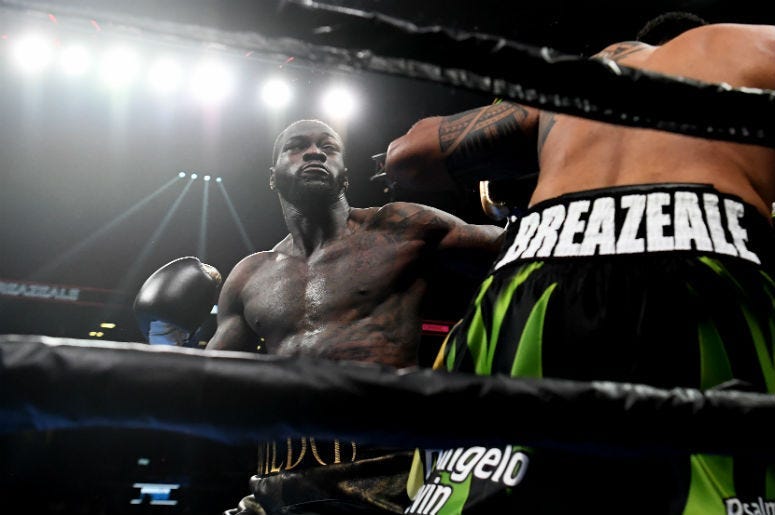
No matter how many blows boxing has taken over the years, it refuses to fall. Like a battered champ who refuses to quit after ten rounds of left hooks, boxing is a sport that endures.
Boxing has enjoyed a resurgence based largely on smaller boxers, because lighter fighters don't have the option of other sports. While the 200-pound athlete can pursue the NBA or MLB and make his millions without the incessant head trauma, team sports don't ship recruiters to the home of 5-foot-6, 147-pound teenagers.
So, it's not shocking that MSG's big fight card over the weekend had Terence Crawford beaming from the marquee. Crawford is one of many electric, eclectic fighters under 160 pounds - such as Canelo Alvarez, Errol Spence Jr, and Vasyl Lomachenko - surging through the heart of the sport.
But no matter how big the small boxer becomes, boxing is biggest when it can showcase its heavyweights. No one stirred the senses over the last 30 years like the massive quartet of Mike Tyson, Evander Holyfield, Riddick Bowe and Lennox Lewis. The boxing maxim says that the good big man beats the good small man.
Enter Deontay Wilder, the affable heavyweight with the thunderous right hand and sprawling list of knockouts (many of which have been featured on Showtime). Not only does he have the goods to give boxing a boost, Wilder - who hails from Alabama - is the first American in nearly 20 years to own the top spot in the top weight. He talks smack, enters the ring in all manner of menacing costume, fights hard and fights for his daughter, who has long suffered from spina bifida.
And nothing completes a fine American heavyweight like a foreign foil. Wilder knows he can fight a bum for fun, a quick paycheck, and a win, but it doesn't excite the masses the way a battle with Anthony Joshua would. The British heavyweight owns three of the four title belts, while Wilder is the WBC champion. Wilder (42-0-1, 41 KO) turns 35 next year, so the window is shrinking on a bout with the younger Joshua (23-1-0, 23 KO), who just turned 30.
A recent piece from BBC.com reports that the two sides are so far apart that a Joshua - Wilder bout could be shoved back two years. This is nothing new to the frustrated fight fan. Boxing has often suffered at its own hand, letting pay and politics create a yearly chasm that keeps the best fighters from fighting each other. Promoters want to keep their stable of fighters free of the physical scars that come from tough fights, and the financial scars that come from losses. But in their greed they forget what made boxing great - a gaggle of great young fighters unaware of any weakness and unafraid of any foes. It’s that spirit which gave us Ali, the Four Kings (Hagler, Hearns, Duran, Leonard), and the small army of lighter fighters from the '90s, from Oscar De La Hoya to Felix Trinidad to Shane Mosley.
Talking trash has long been the prerogative of the boxer. But while both camps bark and blame each other for the fissure that has precluded this fight, they are missing out on the fighters' prime years as athletes and earners. Once Wilder faces Tyson Fury in February, it will mark the fourth time in his last five bouts that he fought Fury or Luis Ortiz. No doubt Fury is a character, with his ogre-like frame and charming backstory as a man literally raised by fighting gypsies, but no one will confuse him with Sonny Liston.
Likewise, Joshua's last two fights have come against Andy Ruiz Jr, the second bout avenging his first loss as a pro. And Joshua has not had a legacy-making moment since beating Vladimir Klitschko over two years ago. But it’s about more than wins and losses, Wilder and Joshua can bring cachet back to boxing's glamour division. Wilder is 6-foot-7, while Joshua is 6-foot-6. Their age, size and egos give this fight a hint of fate.
Fight night used to own Saturday night. Maybe those days are gone, but for one night, and one fight, two hungry and hulking heavyweights can recapture the boxing zeitgeist of the '70s, ‘80s, and '90s. Deontay Wilder and Anthony Joshua need to stop talking and start fighting, or folks will stop caring.
